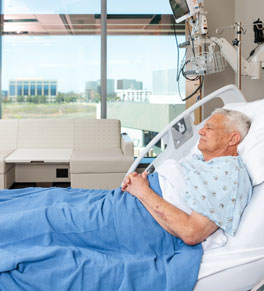
Inflammatory Bowel Disease (IBD) Program
Living with IBD can disrupt every part of your life. At UCI Health, we'll help you take back control.
Living with inflammatory bowel disease (IBD) — including Crohn's disease and ulcerative colitis — can disrupt every part of your life.
At UCI Health, our IBD specialists combine advanced therapies, academic expertise and compassionate support to help you manage symptoms, achieve remission and live well.
As the region's only academic health system, we provide comprehensive, leading-edge care for Crohn's disease, ulcerative colitis, indeterminate colitis and related gastrointestinal conditions. Our multidisciplinary experts combine advanced treatments, compassionate support and innovative research to help you achieve remission and live well.
To request an appointment, please call 888-717-4463 or complete the online appointment form.
Why choose UCI Health for IBD care?
As Orange County's only academic health system, UCI Health offers comprehensive, coordinated care for you if you live with Crohn's disease, ulcerative colitis and other complex IBD conditions.
Our specialists work together across disciplines to provide seamless care focused on you to address your immediate symptoms and long-term health goals.
Our program brings together a dedicated team, including:
- Gastroenterologists
- Colorectal surgeons
- Physician assistants
- Dietitians
- Nurse navigators
- Social workers
- Integrative medicine specialists from the Susan Samueli Integrative Health Institute
We also offer bilingual, culturally inclusive care, which means that no matter who you are, we take time to get to know you. You also have access to UC-based research and clinical trials that give you early access to new treatments.
You'll benefit from our personalized treatment plans, coordinated among GI and surgical specialists. You'll also receive ongoing support through every stage of life, including pregnancy and the transition from pediatric to adult care.
Research and clinical trials
As part of the University of California, our physicians lead and participate in national research that advances IBD care.
We also offer clinical trials that investigate new drug and biologic therapies, diagnostic biomarkers and long-term treatment outcomes. If you participate, you can receive early access to promising new therapies not available elsewhere.
Psychosocial support and community
IBD affects every aspect of your daily life, not just your physical health. That's why our team provides emotional, nutritional and peer support to help you and your loved ones feel informed and empowered throughout your care journey. These services, part of our integrated care, support your well-being at every stage of treatment.
You can also join the longest-running IBD support group in Orange County for peer support. You can also access a J-pouch buddy program that pairs post-surgical patients with peers.
We also offer workshops for you and other caregivers on management chronic illness.
Our approach to IBD
Personalized, team-based care
From your first visit, our clinicians take time to understand your medical history, symptoms and lifestyle before recommending a care plan. You'll meet a coordinated team that guides each step of treatment and follow-up. This team can include your:
- Gastroenterologist
- Surgeon
- Dietitian
- Social worker
- Nurse navigator
We focus on evidence-based medicine and continuity of care, meaning we tailor medication therapy, nutrition and support services to your goals and disease activity.
Looking for more options?
View all clinicians
Let our UCI Health IBD team help you take back control of your life
Call 888-717-4463 or click below to schedule an appointment.

Find a digestive health clinical trial
Talk to your doctor to see if a digestive health clinical trial is right for you.
Current clinical trials
Treatments and services
Once we confirm a diagnosis, our team designs a treatment plan for you. Because UCI Health provides the full range of medical, endoscopic and surgical treatments for IBD, we can tailor your care to your condition, goals and lifestyle.
Medical therapy
Our specialists use biologics, immunomodulators and small-molecule medications to control inflammation and maintain remission. We personalized each treatment plan to maximize benefit and minimize side effects to maintain your quality of life. We also offer therapeutic drug monitoring, meaning you can take your medication with confidence.
Endoscopic therapy
Our IBD gastroenterologists perform chromoendoscopy for dysplasia screening. Our interventional gastroenterologists also perform outpatient procedures such as balloon dilation to treat intestinal strictures and relieve obstruction. This means that you can go home the same day with minimal pain and less recovery time.
Surgical care
Our colorectal surgeons specialize in minimally invastive and bowel-sparing techniques, including:
- J-pouch creation and revision
- Stricturoplasty to preserve bowel length
- Fistula repair and abscess drainage
- Ostomy creation and management
- Complex colorectal cancer surgery related to IBD
Inpatient coordination
If you have a severe disease flare or require hospitalization, our team provides direct inpatient consultation. We also coordinate transfers from referring hospitals.
Supportive and integrative services
We understand that quality of life is crucial when managing a condition like IBD. You will benefit from the following therapies to complement your treatment; all offered through our integrative health team:
- Nutrition counseling
- Mindfulness and stress-management programs
- Acupuncture
Specialized IBD programs
Because everyone's experience with IBD is unique, our specialists collaborate across disciplines. This means you receive additional support through specialized programs designed for your life stage and unique needs.
Pregnancy and postpartum IBD care
We coordinate with high-risk obstetric specialists to provide the best outcome for the birthing parent and their baby.
Transition of care
We provide a structured program to help adolescents and young adults move smoothly from pediatric to adult IBD care.
Extra-intestinal complication management
Our specialists collaborate with rheumatology, dermatology and ophthalmology to maximize your overall health.
Enhanced Recovery After Surgery (ERAS)
We provide evidence-based pathways that improve your recovery and reduce your hospital stay after IBD surgery.
Our clinicians
IBD services are led by Dr. Nimisha Parekh, director of the UCI Health IBD Program and board-certified gastroenterologist.
Our multidisciplinary team includes specialists in gastroenterology, colorectal surgery and advanced practice support.
Gastroenterologists
Colorectal surgeons
- Joseph Carmichael, MD
- Steven Mills, MD, and program surgical director
- Skandan Shanmugan, MD
- Valery Vilchez Parra, MD
- Richard Straker, MD
- Matthew D. Whealon, MD
- Catherine Zhu, MD

Vanessa Sher, IBD patient
“The team immediately made me feels supported. Switching to UCI Health is what made the biggest difference in my IBD journey.”
Read Sher's storyFeatured News Stories

IBD patients should share concerns with physicians, UCI Health expert urges

UCI Health gastroenterologist Dr. Nimisha Parekh recognized as Woman of Impact

UCI Health celebrates more than 200 Physicians of Excellence
Featured Blog Posts

Inspired by nature, created for healing

Finding meaning, connection in Crohn's battle





